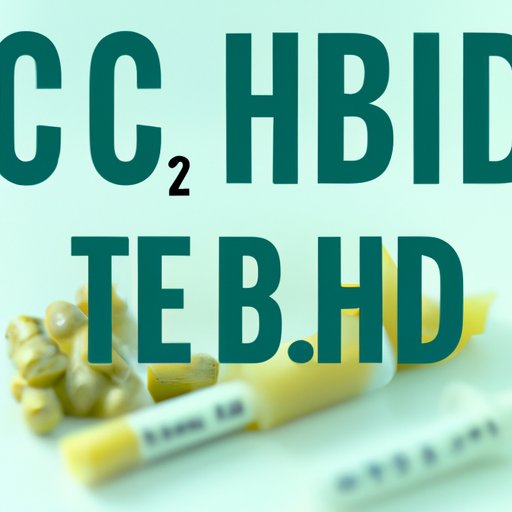Introduction
Cannabidiol, or CBD, has been gaining a lot of attention in recent years for its many benefits. However, there’s still a lot of confusion surrounding whether or not CBD can get you high. This confusion stems from the fact that CBD comes from the same plant as THC, the psychoactive component of cannabis. In this article, we’ll explore the science behind CBD, its differences with THC, and its non-psychoactive properties.
The Science Behind CBD: How It Won’t Get You High
CBD is a chemical compound found in the cannabis plant that interacts with the body’s endocannabinoid system to produce various effects. Unlike THC, CBD doesn’t directly bind to the CB1 receptors in the brain, which are responsible for producing the “high” associated with marijuana use. Instead, it modulates these receptors, producing various non-psychoactive effects, such as pain and anxiety relief.
CBD vs. THC: Why They’re Different and How They Affect Your Body
THC, on the other hand, directly binds to the CB1 receptors in the brain, causing psychoactive effects, such as altered perception, euphoria, and increased appetite. THC can also cause side effects like anxiety, paranoia, and impaired memory, depending on the dose and the individual’s sensitivity to it.

The Truth About CBD and Getting High: Dispelling the Myths
Due to the association between CBD and marijuana, many people assume that CBD can also produce psychoactive effects. However, this is not the case. THC and CBD are two separate compounds that have different effects on the body. There’s also a common myth that CBD needs to be combined with THC to be effective, but this is also false. CBD can be used alone and still produce therapeutic effects without the psychoactive properties of THC.
Exploring the Non-Psychoactive Properties of CBD
Some of the non-psychoactive properties of CBD include its analgesic, anti-inflammatory, and anti-anxiety effects. CBD has been shown to be effective in relieving pain and inflammation, reducing anxiety, and improving sleep. Studies have also shown that CBD can be effective in treating various medical conditions, such as epilepsy, chronic pain, and multiple sclerosis.

Why You Can Take CBD Without Worrying About Impairment
Unlike other medications that can cause impairment, such as opioids or benzodiazepines, CBD does not produce significant psychoactive effects or impair cognitive function. Research has shown that even high doses of CBD do not impair driving performance or cognitive function, making it a safe and effective alternative for people who need pain relief or anxiety reduction.
Understanding the Benefits of CBD Without the High: A Comprehensive Guide
CBD has been shown to have a wide range of medical benefits, such as reducing pain, inflammation, and anxiety, improving sleep, and treating various medical conditions. CBD can also be used in different forms, such as oils, capsules, or topical creams, depending on the desired effect and the individual’s preference. It’s important to note that CBD is not a cure-all and should be used as part of a comprehensive treatment plan.
Conclusion
CBD is a safe and effective alternative to traditional medications for people who need pain relief or anxiety reduction. Unlike THC, CBD does not produce psychoactive effects or impair cognitive function. By understanding the science behind CBD and its non-psychoactive properties, we can make informed decisions about its use and potential benefits.
